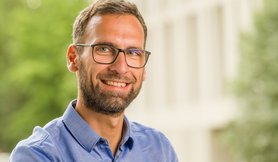![Dr. Sebastian Golz [Translate to English:] Dr. Sebastian Golz an einer Versuchsanlage](/fileadmin/HTW/Hochschule/1_Aktuelles/Veranstaltungen/Besondere_Veranstaltungen/Dies_academicus/Bilder/20230913_SGolz-102-min.jpg)
Prevent, resist and adapt: Building in the face of climate change as a central task
Dr.-Ing. Sebastian Golz starts in the postdoc programme at HTW Dresden
Dr. Sebastian Golz has been part of the HTWD's postdoc programme since August 2023. Over the next few years, the scientist will undergo a qualification programme that will prepare him for a future professorship. He will be supported by his mentor Professor Thomas Naumann and his colleagues at the Institute of Building in a Changing Climate (IBiK).
Mr Golz, you were already working at the HTW before your postdoc. What did you do?
Yes, in fact, I have been working as a scientific project manager at the HTWD since 2018. In numerous third-party funded projects, I worked with colleagues on the question of how we can estimate the damage caused by future flooding and heavy rainfall events to buildings and infrastructure in terms of space and time. Building on this, we also developed flood and heavy rainfall-adapted construction methods in these projects to minimise damage to residential buildings, industrial buildings and engineering structures. As head of a junior research group on the resilience of buildings to extreme environmental events, I was also able to contribute to providing further impetus for climate-adapted construction. The initiative to found the Institute of Building in Climate Change (IBiK) at the Faculty of Civil Engineering emerged from this junior research group.
How did you become a "researcher"? Was there a specific moment that made you realise that you wanted to do research?
I have been dealing with environmental hazards, especially floods and heavy rainfall, and the negative consequences they can have for buildings and infrastructure for more than 15 years. This was triggered by the flooding of the Elbe and its tributaries in August 2002, when I was studying civil engineering at the TU Dresden and living in a shared student flat near the Postplatz. As I was completing my construction internship outside of Dresden during the semester break, I only found out about the acute flooding not only in the city but throughout Saxony via the media. I particularly remember the images of the flooding of the main railway station by the Weißeritz. When the forecasts for the water levels of the Elbe continued to worsen, I feared that our student flat share and some friends and acquaintances would also be affected by the flood in a short time. I travelled to Dresden to clear out my own cellar as a precaution and to help with the construction of temporary flood protection measures for friends' flats in Laubegast.
From this experience, I realised that we as civil engineers could make an important contribution, not only to technical flood protection (dykes, flood retention basins, dams, etc.), but also to concrete property protection and the adaptation of buildings. However, because we still lacked a lot of knowledge in this area at the beginning of the 2000s, I wanted to contribute to reliable damage assessments and suitable structural engineering solutions through research.
What will you be working on as a postdoc at the HTWD?
A major task for me is to further advance climate-adapted construction at IBiK. I am currently working on several research questions, such as how the resilience of buildings to flooding and heavy rain can be "measured" or how heavy rain risks for neighbourhoods and urban districts can be assessed spatially and temporally and presented in 3D portals that can be accessed online. In laboratory tests, I am also investigating how building envelopes behave under different flood impacts or how the damage-reducing effect of various preventive and adaptation measures can be demonstrated. Answering these research questions supports the work of the IBiK.
We wish you a successful time at the HTW Dresden!
The Institute of Building in a Changing Climate (IBiK)
The Institute "Bauen im Klimawandel" (IBiK) brings together researching professors and employees at the HTW Dresden. By pooling interdisciplinary expertise in application-oriented research and consulting, IBiK contributes to innovative solutions for climate adaptation in the construction industry. The institute has set itself the goal of strengthening the resilience of cities and communities to environmental impacts and promoting the development of innovative structural engineering solutions as well as the active new and further development of normative standards and guidelines in construction.
The postdoc programme at HTW Dresden
With the Postdoc Program, HTW Dresden supports highly talented young scientists who have completed their doctorate. The goal is to attract them to research and teaching and to qualify them for a professorship or permanent scientific position at a university of applied sciences (HAW). The postdocs go through two qualification phases that include aspects of teaching and research as well as personal development. Successful graduates receive the "HAW-Postdocplus" certificate. Currently, there are six postdocs at HTW Dresden.
Contact
Dr.-Ing. Sebastian Golz
- Z 521 / BS 002
- +49 351 462 2084


